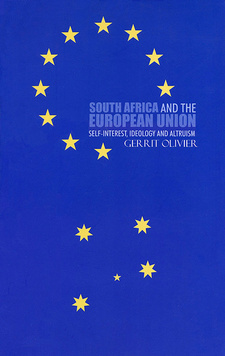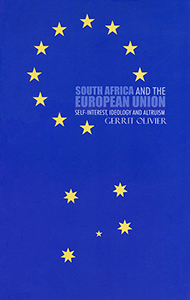South Africa and the European Union: Self-interest, Ideology and Altruism, by Gerrit Oliver

South Africa and the European Union: Self-interest, Ideology and Altruism, by Gerrit Oliver. Protea Boekhuis. Pretoria, South Africa 2006. ISBN 9781869191399 / ISBN 978-1-86919-139-9
Professor Gerrit Olivier was South Africa's first ambassador to the Russian Federation and the Republic of Kazakhstan. As the current director of the Centre for European Studies at the University of Johannesburg, he occupies a leading position in the analysis of and debate about the South Africa/European Union relationship. He ist author of the study "South Africa and the European Union: Self-interest, Ideology and Altruism".
Chapter 2: Europe and apartheid South Africa: The parting of ways
After World War 2, South African/European relations assumed a dual character. Bilateral relations, dominated by the United Kingdom, Germany, France, Italy and the Netherlands, continued to exist, while relations with the European Community (EC) slowly took shape to become meaningful and substantial only after 1994. Special relations with the aforementioned countries were based on economic ties in particular, although the historical, cultural and sentimental relations that grew from centuries of European presence in South Africa and the latter's strategic importance to the West in the Cold War era also played a meaningful role. Because of the repugnance and global condemnation apartheid evoked, both bilateral relations with EC members and multilateral relations with the EC government in Brussels deteriorated sharply in the last quarter of the 20th century, with member countries like the Netherlands, Denmark and Ireland leading this cooler affiliation. It was, however, difficult to find absolute consensus on a common approach in the EC family: conservative administrations in the United Kingdom, Germany, France and Italy continued to maintain good working relations with Pretoria, mainly because of their dependence on the supply of strategic raw materials by the latter, trade, and the perceived geopolitical strategic value of South Africa during the Cold War. This attitudinal dichotomy was also reflected within the EC, where some nations applied sanctions with greater vigour and commitment than others. Although the EC kept Pretoria at arm's length from the start, it entered the active anti-apartheid campaign fairly late. Concrete action was only taken when South Africa's pariah status in world politics was an indisputable reality, with the United Nations' (UN) sanctions regime already in place. The EC's sanctions policy came at a time when it was an unavoidable route to take, when there was no alternative but to follow world opinion as expressed in UN policies and actions.
Declining European influence in South Africa
After the demise of colonialism in the decade after World War 2 and with apartheid becoming the official political policy of the South African government in 1948, European influence declined while the country's international isolation increased. A policy that was regarded by the majority of whites as the road to permanent white security, privilege and hegemony turned out to be the way to catastrophe. Looking at the race policy of the National Party retrospectively, it is indeed hard to understand or explain the intellectual and moral cult as well as the profound ignorance that inspired and underpinned it. The policy of apartheid was an anachronism and a political paradox in the extreme. On the one hand, the Afrikaners' long and bloody struggle against British imperialism and the black indigenous population engendered a survival-at-all-cost national ethos, and the concentration of power at the exclusion of the majority of the population was an institutionalisation of the survival instinct. But on the other hand, what the Afrikaner supporters of the National Party did unto black South Africans was patently abominable, ignorant, short-sighted and inexcusable: theirs was a recipe that eventually resulted in permanent loss of power and marginalization for themselves, and pain, humiliation and hardship for the black population. The victory of Afrikaner nationalism in 1948 and the hegemony that followed came at a time when historical forces began their inexorable move in a new direction, away from racism, colonialism and undemocratic rule. Apartheid was introduced immediately after the devastation of World War 2 and the costly eradication of European fascism, at a time when widespread and intense international repugnance and intolerance prevailed against any notion of racial superiority or racial discrimination. [...]
This is an excerpt from the study: South Africa and the European Union: Self-interest, Ideology and Altruism, by Gerrit Olivier.
Title: South Africa and the European Union
Subtitle: Self-interest, Ideology and Altruism
Author: Gerrit Olivier
Publisher: Protea Boekhuis
Pretoria, South Africa 2006
ISBN 9781869191399 / ISBN 978-1-86919-139-9
Softcover, 15 x 24 cm, 187 pages, English
Olivier, Gerrit im Namibiana-Buchangebot
South Africa and the European Union: Self-interest, Ideology and Altruism
South Africa and the European Union: Self-interest, Ideology and Altruism documents the relationship between the most powerful economic blocs in the world.

